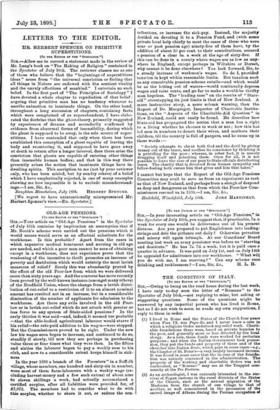OLD-AGE PENSIONS.
[TO THE EDITOR OF THE "SPECTATOR 1 SM.—Your article on "Old-Age Pensions" in the Spectator .of July 16th contains by implication an assumption that if Mr. Booth's scheme were carried out the pensions which it would secure would serve as an effectual substitute for the workhouse. Is this probable ? Apart from the cases in which expensive medical treatment and nursing in old age are needed, and which a poor man cannot be sure of obtaining -except in a workhouse, does not experience prove that the wiveakening of the incentive to thrift promotes an increase of poverty and destitution which would outstrip the most lavish measures of relief ? Surely this was abundantly proved by he effect of the old Poor-law from which we were delivered /more than sixty years ago. And the converse has more recently been proved by the well-known instance (amongst many others) of the Bradfield Union, where the change from a lavish distri- bution of out-relief to a restriction of it to an almost nominal amount has resulted not in an increase, but in a considerable diminution of the number of applicants for admission to the workhouse. Are there any evils involved in the old Poor- law or in lavish out-relief which do not attach with greater or less force to any system of State-aided pensions ? In the early thirties it was said—and, indeed, it seemed too probable —that the able-bodied agricultural labourer would starve if his relief—the rate-paid addition to his wages—were stopped. But the Commissioners proved to be right. Under the new law his wages soon began to increase, and continued to do so, steadily if slowly, till now they are perhaps in purchasing 'value three or four times what they were then. In the fifties and sixties the labourer began to pay a weekly sum to his -club, and now to a considerable extent keeps himself in sick- ness.
In the year 1896 a branch of the Foresters" in a Suffolk 'village, whose members, one hundred and sixty-six in number, were most of them farm-labourers with a weekly wage (ex- cluding harvest-money and a few such extras) of about nine to eleven shillings a week, had actually accumulated a certified surplus, after all liabilities were provided for, of £1,072. The members had to consider what to do with this surplus, whether to share it out, or reduce the con- tributions, or increase the sick-pay. Instead, the majority decided on devoting it to a Pension Fand, and (with some private local help chiefly to meet the cases of those who were near or past pension age) ninety-five of them have, by the addition of about 20 per cent, to their contributions, secured a pension of a. clear 5s. a week at the age of sixty-five. If this can be done in a county where wages are as low as any- where in England, except perhaps in Wiltshire or Dorset, why cannot it be done elsewhere ? You look forward, Sir, to a steady increase of workmen's wages. So do I, provided taxation is kept within reasonable limits. But taxation such as any conceivable pension-scheme entails—and which would be as the letting out of waters—would continually depress wages and raise rents, and go far to make a would-be thrifty man hopeless. The "leading case" on the results of " State- aid " overstepping its just limits is that of New Zealand. A more instructive story, a more solemn warning, than the Report of Dr. Macgregor, Inspector of Charitable Institu- tions, on the "Aspects of the Charitable-Aid Question" in New Zealand, could not easily be found. He describes how State-aid has propagated the notion that a man has a right to a living whether he chooses to work or not ; how this has led men in numbers to desert their wives, and mothers their children, till the country is fall of paupers, and he sums up in these words :— " Society attempts to cheat both God and the devil by giving money out of the taxes, and soothes its conscience by thinking it is providing for the poor; whereas, in sober fact, it is meiely drugging itaelf and poisoning them. Once for all, it is not possible to leave the care of our poor to State officials distributing taxes. The charity that is divorced from human sympathy and fellow-feeling both curses him that gives and him that takes."
I cannot but hope that the Report of the Old-Age Pensions Committee may avail to save us from an experiment as rash as that of New Zealand, and perhaps from a slough of despond as deep and dangerous as that from which the Poor-law Com- missioners rescued us in am, Sir, &c.,
Heckfield, Winchfield, July 19th. JOHN MARTINEA17.


































 Previous page
Previous page